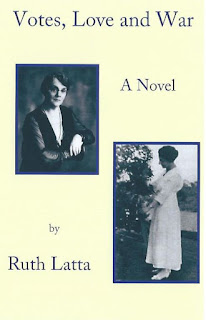 Reviewed by Susan Taylor Meehan
Reviewed by Susan Taylor Meehan
Votes, Love and War
by Ruth Latta
Baico Publishing Inc
2019, ISBN 978-1-77216-191-5, $32
Ruth Latta’s latest novel, Votes, Love and War, tells the story of a young woman caught up in the heady days of suffragism, social and political change, and armed conflict overseas during the First World War. Set in Winnipeg, Manitoba, a melting pot and incubator for political and social activism, the story follows Charlotte Tyler, a young farm girl, as she arrives in the city to pursue a teaching certificate at Normal School in the summer of 1913. Her plans soon go awry as disaster back home makes it impossible for her parents to help her pay her tuition, and she is forced to flee her boarding arrangements at her aunt’s house due to the unwelcome attentions of her uncle.
Desperate, she goes to the offices of the Grain Growers Association, seeking help from Frances Beynon, a journalist she admires at The Grain Growers’ Guide. Touched by Charlotte’s plight, Beynon suggests that she apply as a domestic worker at the house of her sister Lilian, women’s editor of the Manitoba Free Press and Prairie Farmer, and her husband Vernon, a journalist with the Free Press. She is taken on immediately and is soon drawn into their exciting world of journalism, women’s rights and political activism.
Although primarily a work of fiction, Votes, Love and War is grounded in actual historical events and personalities. For example, Frances Beynon and Lilian Thomas (née Beynon) were prominent writers and suffragists in Winnipeg in the prewar and war years, speaking at public events, founding organizations such as the Political Equality League, and publicizing such injustices as the exploitation of women at work in the factory and on the farm. They play a prominent role in this book.
Other well-known figures, such as Manitoba’s Premier Sir Rodmond Roblin, famed feminist Nellie McClung, the Rev. James Woodsworth and numerous political, labour and progressive organizations also appear. Events such as the hilarious Women’s Parliament, a highly successful play in which women took on the roles of the pompous and condescending male legislators while men attempted to present the case for getting the vote, are used to good effect.
But the story isn’t all politics. Woven into Charlotte’s gradual awakening is her personal story – of a lost love back home, her many new friendships in Winnipeg, most of whom she met through her employers, and the occasional romantic interest. We get a close look at life in the early 20th century through her family, her home town and the people she grew up with. We also get a good look at life in Winnipeg during the war years as Charlotte becomes increasingly involved in the suffrage movement, participating in public events and meeting some of the most prominent and influential people of the day.
When the war breaks out, the political landscape shifts and public attention is diverted from women’s suffrage and other domestic issues to events in Europe and the young men who went off to war. One of those young men was Peter Tyrell, whom Charlotte was seeing, and suddenly the war becomes much more real to her. She struggles with the rising jingoism at home and the terrible news from the front. When Peter is killed at the Second Battle of Ypres, she is heartbroken and vows to avoid all romantic entanglements until the war is over.
Shortly afterwards, Charlotte learns that there is enough money for her to attend Normal School. She soon strikes up a friendship with Basil Weaver, a male student whose injuries in a car accident render him unable to enlist. The relationship blossoms, and Charlotte’s vow evaporates as she and Basil grow ever closer.
Meanwhile, opposition to the war grows, including with Charlotte’s former employers, Lilian and Vernon, who are soon sacked from the Free Press and on their way to New York. Now without a home, Charlotte moves in with the Weaver family. After the end of their first school year teaching, Charlotte and Basil get married and Basil, now recovered from his injuries, enlists.
Charlotte goes on with her teaching career while Basil is at the front. Events continue to unfold as controversy deepens over the war, labour unrest rises, and the last push in the Allied campaign comes up against the Spanish flu, which took a major toll in Winnipeg. The following year (1919), the Winnipeg General Strike forces Charlotte and Basil, who is back home but seriously injured, to help pro-strike friends avoid arrest. It is an eventful life, and as the novel wraps up, we see that while the pace may lessen, Charlotte will continue to be an active participant in her life and times.
In many ways, the setting in which the story takes place plays the role of another character in this book. The background is well-researched and described in accessible language that doesn’t sacrifice nuance and doesn’t compromise the human element. The author uses correspondence and newspaper clippings to give an air of authenticity to the historical narrative, and because the characters are all intimately involved in the major trends and events of the war and post-war years, the reader is drawn into their struggles and triumphs.
For readers interested in this seminal moment in Canadian history and its impact on the people who lived it, Votes, Love and War is both an excellent introduction and a wonderful read.
About the reviewer: Susan Taylor Meehan’s most recent novel is Halcyon Days, (Burnstown, Ontario, Burnstown Publishing House, 2019, ISBN 978-772-572-445, $25). It chronicles the story of a small town in Saskatchewan struggling to cope with the drought and depression of the 1930s and forced to confront a terrifying discovery that only a handful of traumatized children can resolve.